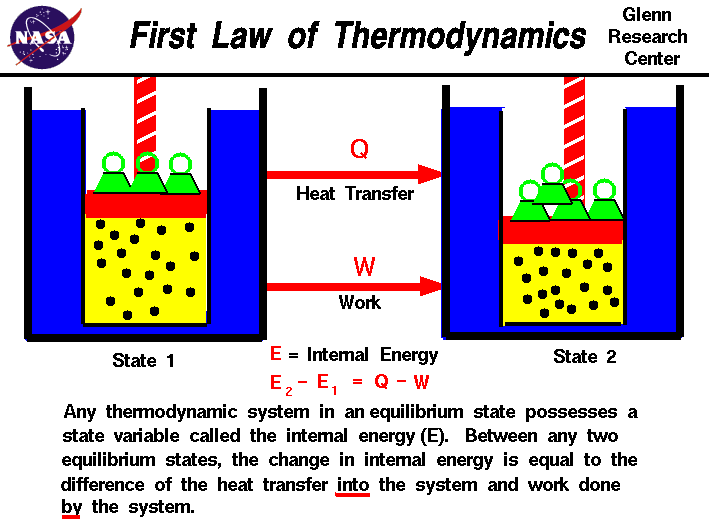Thermodynamics, the branch of physics that deals with heat and temperature, stands as a monumental pillar within the scientific edifice of our understanding of the universe. Yet, beyond the realm of quantifiable measures and scientific principles, one can glean profound spiritual insights from thermodynamic theory, especially when examined through the lens of Bahá’í teachings. In exploring the intersection of this natural science and spiritual philosophy, we unearth a unique tapestry of knowledge, reminiscent of an intricate dance between the material and the spiritual.
At the core of thermodynamic principle lies the First Law, often articulated as the principle of conservation of energy. This law posits that energy cannot be created or destroyed; rather, it can only be transformed from one state to another. Here, we encounter a resonance with Bahá’í teachings, which emphasize the innate interdependence of all beings. Just as energy transitions through various forms—be it from kinetic energy in a moving body to thermal energy in a heated one—Bahá’í philosophy teaches that divine truth, love, and compassion traverse through the fabric of human existence. They persist, offering transformative potential wherever they manifest.
The Second Law of Thermodynamics introduces us to the concept of entropy, a measure of disorder and the inevitable trend towards chaos within an isolated system. Envision a pristine, meticulously arranged room; left unattended, it will inevitably succumb to disarray. Analogously, within the Bahá’í framework, spiritual growth is never automatic; it demands conscious cultivation. Humans, as sentient beings endowed with free will, possess the ability to instill order within the chaos of existence. The continuous nurturing of virtues serves as our contribution towards minimizing spiritual entropy. The more adept we become at harnessing the energies of love, unity, and service, the more we raise our collective vibratory state, combating the existential drift towards disarray.
The Third Law culminates this exploration, elucidating that as a system approaches absolute zero, the entropy of a perfect crystal tends towards a minimum. This intriguing notion can be poetically analogized to the Bahá’í aspiration for a unified humanity. In the pursuit of a world marked by justice and peace, individuals might sometimes feel the chilling proximity of material detachment, akin to that absolute zero. However, it is at this very juncture—where individual efforts seem most minuscule—that the collective heartbeat of a compassionate society can ignite a fervent revival. Together, certain transformations may appear improbable; yet, when ignited by a coalition of kindred spirits, the resultant energy can resonate vibrantly throughout the fabric of existence.
The concept of equilibrium in thermodynamics—where opposing forces balance—serves as a striking metaphor for the Bahá’í injunction of moderation. The Bahá’í teachings encourage the pursuit of harmony, both internally and externally. In balancing the aspirations of spiritual advancement with the practicalities of material life, individuals engage in a holistic embrace of existence. Just as thermodynamic systems reach dynamic equilibrium, wherein energy exchanges are optimized and sustained, individuals achieve fulfillment when they navigate the delicate interplay between material needs and spiritual aspirations.
Moreover, consider the intricate complexities of phase transitions, where substances shift from one state to another—solid to liquid, liquid to gas—as they absorb or release energy. This phenomenon mirrors the human capacity for transformation through divine revelations and teachings. Just as water metamorphoses under varying temperature conditions, so too can individuals evolve when imbued with the teachings of the Manifestations of God, the central figures within Bahá’í belief. This transformative engagement illuminates the essence of progress, enkindling the spirit to rise toward loftier planes of understanding.
Further, thermodynamics elucidates the interdependence of systems. In the grand tapestry of existence, all entities rely upon each other, forming a delicate network akin to the interconnected human family highlighted in Bahá’í doctrine. The notion of these systems, though seemingly disparate, harmoniously influencing one another propounds a striking philosophical underpinning. Each individual’s actions reverberate throughout the universal fabric—a reminder that our contributions to society are never isolated but are integral to the symphony of collective advancement.
Incorporating the metaphor of energy conversion, the Bahá’í teachings hold that divine energy is neither finite nor restricted to certain individuals; rather, it flows through those who are receptive. Each time an individual engages in acts of service, compassion, or kindness, they convert their latent potential into kinetic spiritual energy, propelling change in a world often beleaguered by discord. Within this framework, the idea of converting potentials into action serves as an enduring call to arms, urging humanity towards active engagement in the betterment of collective existence.
The intricate dance of thermodynamics posits a vantage point from which to consider the spiritual dimension of our lives. The interplay of forces that govern the natural world parallels the spiritual truths espoused in Bahá’í teachings, compelling us to look beyond mere surface interactions and towards the foundational energies that animate our collective existence. By embracing these universal principles, we cultivate an awareness of our interconnectedness and assume responsibility for elevating our shared reality.
In summation, the profound implications of thermodynamic principles serve as a metaphorical bridge to understanding Bahá’í teachings. As we navigate our existence through an acknowledgment of energy conservation, entropy, and transformation, we come to realize that the universe mirrors the indomitable spirit of humanity. Each individual emanates a unique energy, contributing to a larger symphony of existence, where harmony and balance reign supreme, underpinned by a profound commitment to service, unity, and love.
